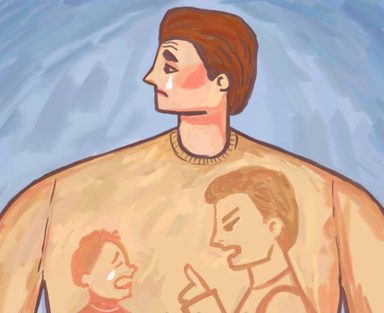Written by Madison Chen, MCP, RCC
It’s no surprise that therapy often leads us to uncover that the roots of our challenges are frequently traced back to our family of origin and childhood experiences. My journey with body image is no exception. Today, I’ll be sharing a bit of my journey – my ongoing work with body image.
Growing up as a pudgy child turned my home and school into battlegrounds. I have vivid memories of sneaking into the kitchen looking for food, playing a game of cat and mouse with my fitness fanatic grandpa. I was no older than 7 or 8 at the time, and I remember his towering presence as he lectured me about the importance of physical appearance and attractiveness. “People would judge you for the way you look,” he would say. Having an athletic sibling only made the situation worse. He often compared our looks and told me to “stop drinking milk and drink water instead.”
School wasn’t any better. I was “voluntold” to be part of a fitness program where we would gather during lunch breaks and run laps around the school. PE was my least favourite class because I was so frequently the last student to be picked on any sports team. The team would often complain that they ended up with a dud.
I remember feeling confused. I wondered why my looks were deemed undesirable and what made it so important to be able to run 100m in less than 15 seconds. The little me didn’t have the vocabulary to articulate what I was feeling—sadness and fear. I was sad that I couldn’t fit in or be accepted.
Fast forward 20 years, during a dinner conversation with my brother and partner, the topic of eating habits came up. Thinking that everyone did this, I mentioned to them that I would routinely have exhausting conversations with myself while eating. “Have I run enough on the treadmill today? Can I have some more potatoes? Are you sure you’re gonna have dessert?” were the kinds of questions I would have with myself. And I was baffled when I found out that neither of them were like me.
As a therapist, I often help clients connect with their inner child. Little did I know that little me has been doing some heavy lifting himself, carrying the burden from my childhood.
With the help of my personal therapist, I began my own work. In my mind’s eye, I visited young Madison. I held his hand and sheltered him from the lectures of my towering grandfather. I patted his head and invited him to play when he felt rejected by his peers. I sat with and witnessed little Madison’s helplessness, confusion, and sadness. With time, patience, and practice, I am able to better comfort and reassure him when he becomes anxious about overeating and “being lazy.” Harsh words are replaced with gentle self-compassion, and it allowed me to reach out to my mother and ask for her protection and reassurance that was unavailable to him at that time.
This is not to say that little Madison has completely let go of his burden. In fact, he will always be part of me, vulnerable and insecure at times. But unlike the past, he’s no longer alone. He has the support of my parents, my brother, my partner, my therapist, and most importantly, me.
And of course, the work of witnessing can be daunting and lonely. And I’ll forever be grateful for my therapist. Now, I aspire to walk with you in the same way he walked with me whenever you’re ready.

